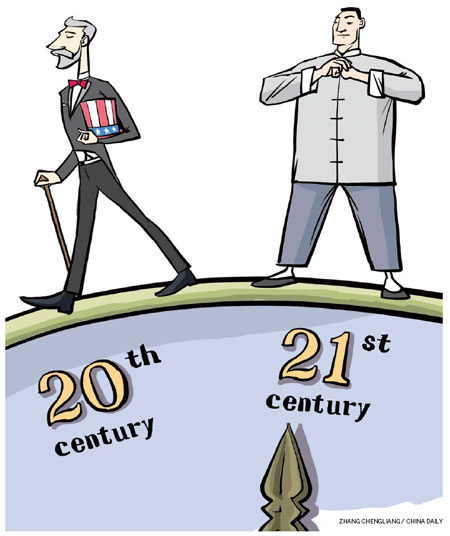The subtleties of diplomacy
Updated: 2011-09-02 10:17
By David Gosset (China Daily)

China's approach transcends the world of hard and soft power
When the American publishing magnate Henry R. Luce (1898-1967) announced 70 years ago the beginning of the "American century", he anticipated the US preeminence that followed World War II but he overestimated the duration of Pax Americana. Ironically, Luce who spent 15 years of his early life in China, would have been also very much at home in the 21st century where globalization increasingly rhymes with Sinicization and less and less with Americanization.
The contrast between the erosion of American power and China's ascension appeared vividly when US Vice-President Joe Biden was obliged during his recent visit to China to address the concerns of the Chinese people who are "skeptical about America's future prospects" - the wording used in his Chengdu speech - and had to repeat three weeks after the US Congress' acrimonious debate over the debt limit and the subsequent downgrading of the American credit rating by Standard & Poor's that the "US, which has never defaulted, will never default".
Obviously, Biden's defensive rhetoric could not hide the long-term problems of a country that has become sadly paralyzed by a parochial and short-sighted political establishment, unable to tackle debt addiction and to solve the contradictions between an overstretched military and the considerable financial interests of the military-industrial complex. While the world increasingly questions Washington's reliability, Beijing's credibility is on the rise and, in the eyes of many analysts, China's prudence balances America's irresponsibility.
China's renewal is not only super rapid quantitative progress but it is also defined by a rising qualitative global influence. One easily notices the signs of China's Westernization but China's embrace of modernity is also synonymous with the Sinicization of the global village. Apt to project a Chinese global narrative through increasingly sophisticated media, promoting Mandarin in more than 300 Confucius Institutes all over the world, attracting more and more foreign students in its universities, relying on opinion leaders such as Zhang Weiwei or Eric X. Li who are equally at ease in the West and in the Sinosphere, having highly competent experts in strategic international positions - Zhu Min, the new deputy managing director of the International Monetary Fund, or Justin Yifu Lin, the senior vice-president at the World Bank - China is rapidly strengthening its soft power.
After the work of US scholar Joseph Nye, it is common to limit the debate on national comprehensive strength to hard and soft power whose combination would supposedly form a "smart power". However, the patterns of Beijing's transformation invite the analyst to enlarge the reflections and to consider a third dimension of power, "subtle power", which is, to a certain extent, the application of some of China's highest philosophical principles in the field of strategy.
Less spectacular than hard power, more intangible than soft power, subtle power aims to shape a context that maximizes the effectiveness of the two traditional dimensions of power. While hard power acts directly, including by force, to impose itself, and while soft power attracts and cooperates, subtle power sets the environment in which hard and soft power can produce optimal effects.
The extraordinary Chinese ability to contextualize prepares the country's top decision-makers to have a holistic approach to world affairs that should not be interpreted as a refusal to take a clear position or responsibility on any singular question but should be understood as the prudence to carefully consider how actions on one particular issue may affect the entire equilibrium of the system. While hard and soft power analyze and target the almost endless individual components of the global power game, subtle power comprehends synthetically their interactions.
Subtle power's efficacy lies in the permanent interplay of five elements. First, it attributes a very high value to non-confrontation. Beijing's aptitude to implement an active multidirectional diplomacy and to avoid unnecessary opposition not only provides opportunities to satisfy the needs of China's development but elevates the country's status. Being able, for example, to maintain good relations with both Iran and Israel, or with both Teheran and Riyadh, Beijing is increasingly perceived in the Middle East as a factor of stability and a powerbroker.
Second, subtle power is associated whenever possible with non-interference. On its west, China neighbors Kyrgyzstan and Tajikistan, two relatively small countries, but Beijing does not try to impose on these new states any macro-economic guidance or a political roadmap. While Afghanistan and China's Xinjiang share 76 km of border, it is the US and NATO that are trapped in the Afghan quagmire.
The non-confrontational posture and the principle of non-interference are consistent with a policy of strategic independence whose objective is more about diminishing the risks of making enemies than the pursuit of alliances. One can make the mistake of labeling China's disposition to non-interference as an isolationist tendency if one postulates that isolationism is the opposite of interventionism.
However, far from being mutually exclusive, isolationism and interventionism are in fact expressions of the same propagandist spirit, isolationism being frustrated interventionism. China, which has never been agitated by a desire to convert the world to its norms and beliefs, does not have the idiosyncrasies of a disappointed crusader.
Third, subtle power envelops a permanent readiness for change. Beijing's recent moves toward pivotal Sudan can be seen as an illustration of this point. Despite its strong links with Khartoum - Sudan's President Omar al-Bashir had talks in Beijing at the end of June - Chinese Foreign Minister Yang Jiechi visited Juba one month after South Sudan's declaration of independence, becoming the first foreign minister representing one of the permanent members of the United Nations Security Council to make such a visit.
Restraint should be considered the fourth feature of subtle power. When Henry Kissinger evokes the 1979 Sino-Vietnamese war in his magisterial On China he remarks: "As in the Sino-Indian War, China executed a limited 'punitive' strike followed immediately by a retreat." More generally, China is well aware that the capacity to limit oneself and to avoid any kind of excess including unnecessary military adventures is in the long term the condition to preserve one's relative strength.
By contrast with European historical dynamics, the effort to unify the Chinese world has always been one of the Chinese civilization's main trends. In this perspective, the future of Taiwan is, with the territorial integrity of the People's Republic of China, one of the most important issues for Beijing's leadership. In 2010, 1.6 million mainlanders visited the island injecting more than $3 billion (2.1 billion euros) in Taiwan's economy. Expectedly, Beijing reacts with strong statements when it considers that the US is interfering in China's internal affairs but the mainland's Taiwan policy also illustrates Beijing's use of restraint.
Ambiguity is the fifth mark of subtle power. Subtle power is also the cultivation of ambiguity and vagueness which are too often poorly interpreted as mystery and obscurity.
The attempt to define subtle power is almost self-contradictory; it is not a set of predetermined rules or procedures to follow mechanically but the art of creating a favorable context; it is not a self-proclaimed indispensability, superiority or grandeur but, in a constantly changing configuration, the capacity to maintain centrality.
Instead of its complacent litanies on what it perceives as China's essential imperfections, the West should seriously focus on what it could learn from the nuances of Beijing's subtle power. To a certain extent, it is a relatively Sinicized West and a reasonably Westernized China and their constant interactions which could constitute for mankind an infinite source of synergies.
Being so deeply congenial with the Chinese culture, subtle power carries the Chinese traditional emphasis on moderation and peace embodied in the character he or harmony, and as such it supports the idea that a major redistribution of power does not necessarily have to emerge from the tragedies of wars.
David Gosset is director of the Euro-China Center for International and Business Relations at CEIBS, Shanghai & Beijing, and founder of the Euro-China Forum. The opinions expressed in this article do not necessarily reflect those of China Daily.
E-paper

City's dynamic teutons
German cluster gives a fillip, competitive edge to local economy in Taicang
Short and sweet
Game for growth
Character reference
Specials

Hunting grounds
Opinion divided as China debates opening door to international players

Flying the TCM flag
A small German town is home to Europe's flagship clinic for traditional Chinese medicine

Animal attraction
World's youngest chief fur designer set to launch own label and tap into huge China market.
